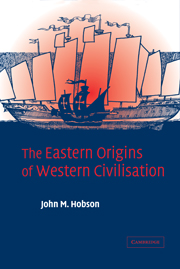Book contents
- Frontmatter
- Contents
- List of tables
- Preface and acknowledgements
- Map: Hobo-Dyer projection of the world
- 1 Countering the Eurocentric myth of the pristine West: discovering the oriental West
- I The East as an early developer: the East discovers and leads the world through oriental globalisation, 500–1800
- II The West was last: oriental globalisation and the invention of Christendom, 500–1498
- III The West as a late developer and the advantages of backwardness: oriental globalisation and the reconstruction of Western Europe as the advanced West, 1492–1850
- 8 The myth of 1492 and the impossibility of America: the Afro-Asian contribution to the catch up of the West, 1492–c. 1700
- 9 The Chinese origins of British industrialisation: Britain as a derivative late developer, 1700–1846
- 10 Constructing European racist identity and the invention of the world, 1700–1850: the imperial civilising mission as a moral vocation
- 11 The dark side of British industrialisation and the myth of laissez-faire: war, racist imperialism and the Afro-Asian origins of industrialisation
- IV Conclusion: the oriental West versus the Eurocentric myth of the West
- Notes
- Index
11 - The dark side of British industrialisation and the myth of laissez-faire: war, racist imperialism and the Afro-Asian origins of industrialisation
Published online by Cambridge University Press: 22 September 2009
- Frontmatter
- Contents
- List of tables
- Preface and acknowledgements
- Map: Hobo-Dyer projection of the world
- 1 Countering the Eurocentric myth of the pristine West: discovering the oriental West
- I The East as an early developer: the East discovers and leads the world through oriental globalisation, 500–1800
- II The West was last: oriental globalisation and the invention of Christendom, 500–1498
- III The West as a late developer and the advantages of backwardness: oriental globalisation and the reconstruction of Western Europe as the advanced West, 1492–1850
- 8 The myth of 1492 and the impossibility of America: the Afro-Asian contribution to the catch up of the West, 1492–c. 1700
- 9 The Chinese origins of British industrialisation: Britain as a derivative late developer, 1700–1846
- 10 Constructing European racist identity and the invention of the world, 1700–1850: the imperial civilising mission as a moral vocation
- 11 The dark side of British industrialisation and the myth of laissez-faire: war, racist imperialism and the Afro-Asian origins of industrialisation
- IV Conclusion: the oriental West versus the Eurocentric myth of the West
- Notes
- Index
Summary
Colbert appears … not to have been the inventor of [the protectionist] system … for … it was fully elaborated by the English long before him.
Friedrich ListThe Pax Britannica, always an impudent falsehood, has become a grote-sque monster of hypocrisy.
John A. HobsonThe only lesson to be learnt is that East and West are no more than names … He who wants to will conduct himself with decency. There is no people for whom the moral life is a special mission.
Mahatma Gandhi[The British empire was] a magnificent superstructure of American commerce and [British] naval power on an African foundation.
Malachy PostlethwaytWe noted in ch. 9 that British industrialisation occupies a special position within the Eurocentric discourse of world history. We also noted that the key to Britain's ‘Great Leap Forward’ lay with its individualistic self-help culture within which all manner of ingenious inventions were pioneered. In turn this is conventionally assumed to be a function of the minimalist laissez-faire (non-interventionist) posture of the state. And this in turn feeds back into the general Eurocentric proposition that British industrialisation was a purely internal affair founded on self-generated change.
In this chapter I challenge this picture by making two general arguments: first that the British state is better understood as a despotic, interventionist late developer that played a vital role in enabling industrialisation. The first and second sections elaborate on this argument as it applied to the domestic arena.
- Type
- Chapter
- Information
- The Eastern Origins of Western Civilisation , pp. 243 - 280Publisher: Cambridge University PressPrint publication year: 2004



